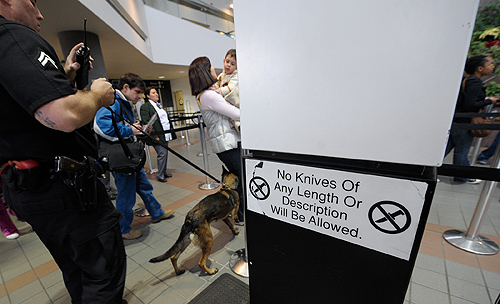|
 |
|
STRENGTHENED SECURITY CHECKS: A policeman uses an explosive-sniffing dog to monitor passenger luggage at the Los Angeles International Airport on December 27, 2009 (QI HENG) | On its rebirth, Al Qaeda in Yemen continued to modify its strategies where it had left off. This included cooperation with rebels in the north, and separatists in the south of Yemen. Al Qaeda militants further colluded with terrorists in Somalia and Saudi Arabia beyond Yemeni borders, evolving into a greater concern yet for Sana'a and Washington.
After the near-downing of Flight 253, the Al Qaeda branch in Yemen immediately claimed responsibility. The militants also released videos in which they threatened to make more severe attacks. Given all this, the rise of Al Qaeda's franchise in Yemen cannot be ignored.
Adjustment pressure
Further proof that the United States recognizes the importance of the Yemeni situation, if any were needed, came on January 2, when David Petraeus, Commander of the U.S. Central Command, met with Yemeni President Ali Abdullah Saleh.
During the talks, Petraeus, widely revered in Washington for his military strategies during the occupation of Iraq, pledged to increase counterterrorism assistance in Yemen to $190 million this year.
The United States, meanwhile, has voiced its intent to strengthen economic aid to Yemen. Currently, a series of assistance plans have been brought forward. They promise to create more job opportunities for the Yemeni people, while promoting Yemen's educational and medical care development. More such programs are on the horizon.
Until now, although Washington has not declared any intent to deploy troops to Yemen, it is fast becoming all but inevitable that military assistance may soon be on the way. The U.S. antiterrorism layout in South Asia will thus be constrained as a result.
The United States is facing the daunting task of confronting terrorism in different locations worldwide. Indeed, in 2009, the international terrorist situation was deteriorating as a whole. Besides Yemen, terrorist forces were at work again in Europe, for instance--most notably in the form of bombings by ETA, a nationalist group in the Basque region of Spain.
Regions elsewhere in the Middle East, North Africa, South Asia, Central Asia and Southeast Asia, of course, witnessed even more bloodshed.
Despite a degree of political reconciliation, the situation in Iraq has deteriorated rapidly, too. Last year, for example, there were more than 2,000 reported terrorist incidents--twice as many as that of 2008.
Pakistani Taliban militants, meanwhile, stiffened their resistance in the face of counterinsurgency operations by Islamabad's military forces. At the same time, rebel forces in Afghanistan have gained their highest momentum than at any point since 2001. Terrorist activities are also spreading to its west and north.
In India, terrorist activities have also become more pronounced, as Jemaah Islamiyah, the notorious Islamic group in Indonesia, has reactivated after a spate of crackdowns. The nettlesome Philippine group Abu Sayyaf has also revived under the leadership of a new generation of terrorists.
Against this backdrop, strategic adjustments are called for.
Indeed, signs of change continue in the United States--many often beyond the control of the Obama administration. Some members of the U.S. Congress, notably, have called for reviewing Obama's policy on relocating Guantanamo Bay detainees.
It goes without saying that, after eight long years of destructive unilateralism by the Bush administration, President Obama has shown a nimble willingness to adopt a shrewd strategy of "smart power."
But it would be wrong to say that Northwest Flight 253 did not expose the many loopholes in the U.S. antiterrorism policies--fissures that have provided ample opportunities with which terrorists can maneuver.
Closing these gaps will necessitate a broad undertaking--while posing some serious existential questions. How can the United States further carry out the diplomacy of smart power, for example? The answers to this and other critical questions will pose a severe test for the obvious wisdom of the Obama team.
The author is an assistant research fellow with the China Institutes of Contemporary International Relations
| 